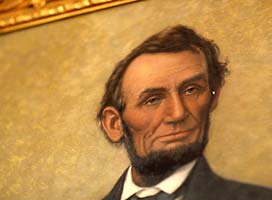

Venture Boldly

Adriana Colindres
Features Editor
2 East South Street
Galesburg, IL 61401

By Matt McKinney ‘13
"At last I have gone through college," Abraham Lincoln is said to have proclaimed while climbing through a window at Knox College during his run for the United States Senate. More than 150 years later, his charm and allure are just as powerful.
Jennifer Weber, an assistant professor of history at the University of Kansas, presented a lecture at Knox College on Friday, September 24, entitled "Lincoln and Executive Power." The event, which took place in the Alumni Room of Old Main, was sponsored by Knox's Lincoln Studies Center.
Weber, who is on the center's board of advisors, described Lincoln's massive expansion of presidential power during his time in office from 1861 to 1865, which coincided with the U.S. Civil War. In an effort to prevent riots and the secession of northern states, Lincoln suspended the writ of habeas corpus, a right that safeguards individuals from illegal detention or imprisonment. Lincoln also blatantly ignored several court rulings that he had overstepped his authority as president.
"Lincoln was willing to do pretty much anything he thought was right in order to win the war," Weber said. "History has largely vindicated him for the decisions he made in office."
Historical evidence now suggests that Lincoln's decisions on suspending habeas corpus were "rational responses to the crisis at hand," she said.
Weber referred to the work of Lincoln scholar Mark Neely Jr., who found that most of the arrests in which habeas corpus was suspended would have occurred even with habeas corpus in place. Few of the arrests were politically motivated, and most involved offenses such as espionage, treason, and draft-dodging. Neely wrote about Lincoln and civil liberties in his Pulitzer Prize-winning book The Fate of Liberty.
Other presidents, including Woodrow Wilson during World War I and Franklin Roosevelt during World War II, used Lincoln's claims to power as license to expand their own authority during wartime. Yet, she noted, many historians frown upon the thousands of convictions made under Wilson's Sedition Act, which was meant to suppress the voice of anyone critical of the United States. Roosevelt's use of internment camps to detain thousands of Japanese-Americans during World War II was a similar abuse of power, she said.
Weber said many scholars wonder why history regards Lincoln's decisions in a different light.
"Lincoln's actions were incremental and limited," she explained. "They did not target a specific group of people. Wilson and Roosevelt tended to overreact with sweeping edicts that targeted immigrants, political opponents, or ethnic groups, resulting in some of the grossest violations of civil liberties in American history."
Weber also noted that with the Civil War, Lincoln faced an "existential crisis, the likes of which no other president has confronted in American history."
Lincoln's anti-slavery principles have a strong history at Knox College. The Reverend George Washington Gale, a Presbyterian minister and slavery opponent, founded the school in 1837. He was later indicted for giving refuge to runaway slaves.
Knox also is home to one of the famed Lincoln-Douglas senatorial debates of 1858. Old Main, a National Historic Landmark, was the site of the fifth of the seven debates, and it is the only building remaining from the debate sites.
Weber earned master's and doctoral degrees from Princeton University after receiving a bachelor's degree from Northwestern University. Her first book, the critically acclaimed Copperheads: The Rise and Fall of Lincoln's Opponents in the North, is about Northern anti-war protesters during the Civil War. Her most recent project is a children's book entitled America's Bloodiest Days, which depicts the Battle of Gettysburg and its aftermath.
Published on September 29, 2010